Foreword
Published online by Cambridge University Press: 11 May 2017
Summary
Why Afro-German? Why Africa and Germany? As much as this coupling may seem surprising or unexpected, it turns out, on closer examination, to be uncannily familiar, sometimes a topic of explicit consideration in foundational texts, sometimes only a fragmentary reference. Yet be it as fading trace or as foregrounded topic, a linkage of the two terms shows up repeatedly in the writings of seminal thinkers. In key texts, pertinent to definitions of both Germany and Africa, the other term suddenly appears and takes on a pivotal importance: “Africa” as a referent for German self-reflection, and “Germany” as a figure in the emergence of pan-African consciousness. Despite an initial assumption to think them apart from each other, there is evidence that they tend to converge. It appears that the twain shall meet, in complex entwinements of separation and identification, dialectics of negation and appropriation, spread out through histories of subjectivity and across maps of colonialism and migration.
Consider for example Thomas Mann's novella, Mario and the Magician, published in 1930, the year after the author had been awarded the Nobel Prize for Literature. One of the best known works of the leading German writer of the twentieth century, it is the story of a German family's summer vacation to a seaside resort in Italy. While the first-person narration is very much unpolitical—in the mode of the “unpolitical” character of German conservatism that Mann himself had expounded in his polemical essayism during World War I—it is nonetheless perfectly clear that this travelogue is very much about politics: the story of going to the beach in fascist Italy. It is in effect a conservative description of totalitarianism, addressed to a democratic audience. In other words, Mann has fashioned a text for his readers in the Weimar Republic, Germany's fledgling democracy, that amounts to a conservative German's report on the character of life and culture under Mussolini.
Not only life and culture are at stake, however: at a crucial point Mann has his narrator, concerned like every summer vacationer with the weather, choose to describe Italian heat, oddly, as “African.”
- Type
- Chapter
- Information
- Not So Plain as Black and WhiteAfro-German Culture and History, 1890–2000, pp. vii - xviiiPublisher: Boydell & BrewerPrint publication year: 2005

